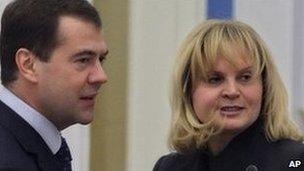Russian rights activist Ella Pamfilova quits Kremlin
- Published

Ms Pamfilova said she did not want a further political career
One of Russia's most senior human rights campaigners has resigned from her position as head of an advisory council to President Dmitry Medvedev.
Ella Pamfilova, head of the president's council on human rights and civil society for six years, gave no reason.
But a colleague told the BBC she had been dismayed by the lack of support she had received from the president.
She had, her colleague said, been under attack from groups associated with hardline members of the government.
The BBC's Richard Galpin in Moscow says that when President Medvedev came to power two years ago, he made it clear he wanted to listen to the views of non-governmental organisations, including those defending human rights.
He adds that the sudden resignation of Ms Pamfilova, which was accepted by Mr Medevedev on Friday, is a blow to his reputation.
The youth group called Nashi, set up when Vladimir Putin was president, has frequently called for her resignation and is currently trying to sue her for slander after she criticised it last week.
Our correspondent says that as the government has become increasingly authoritarian over the past decade, speaking out about human rights violations has become increasingly difficult and dangerous, and many prominent activists have been killed.
'Huge loss'
Insisting her decision had not been taken suddenly, Ms Pamfilova said she intended to "change her sphere of interests radically".
"This will definitely not be politics or state service," she said.
She proposed economist Alexander Auzan as her replacement. Professor Auzan said he had not been approached by the Kremlin.
Ms Pamfilova, a veteran politician who served as an MP in the dying days of the USSR and stood for president in 2000, was appointed to her advisory post in 2002 under President Putin.
In March, she told EU officials that Russia's democratic institutions were underdeveloped and that said she had not seen any significant changes in the civil rights area.
A Russian researcher for Human Rights Watch, Tanya Lokshina, told the BBC that Ms Pamfilova had played a vital role.
"She's really been the interlink between the human rights community in this country and the Kremlin, and without her Russian civil society is going to suffer, it's going to be a huge loss," she said.
Ms Lokshina said she did not think the new powers granted this week to Russia's FSB secret police were behind the resignation.
"I'm rather inclined to believe that she's very worn out by the attacks against her by pro-Kremlin youth movements such as Nashi, some very aggressive, and also some of her adversaries in the president's office."
- Published6 March 2012